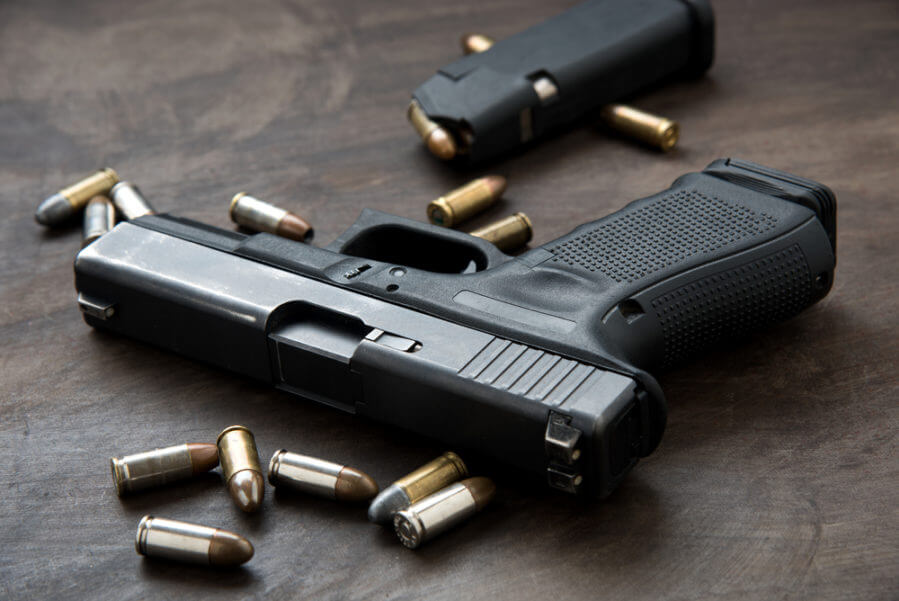
Former Virginia governor Terry McAuliffe, who’s running for another term, discussed gun violence prevention with state activists.
MCLEAN – Approximately 1,000. That’s the number of Virginians gun violence kills every year.
“That’s three per day. Three per day is too many,” said Terry McAuliffe, former governor of Virginia. “And if we want to honor [them] and do the right thing, we need to shake it up and we need to move forward. We need to do it collectively.”
On the 14th anniversary of the Virginia Tech mass shooting that claimed 32 lives, McAuliffe hosted a conversation about gun violence and how to prevent it.
Multiple gun violence prevention advocates joined the conversation, including trauma surgeon and nationally recognized advocate for gun violence prevention Dr. Joe Sakran, Virginia Director of the Coalition to Stop Gun Violence and mother of a Virginia Tech survivor Lori Haas, along with Roanoke Mayor Sherman Lea, Sr.
Activism Starts
The panelists weren’t born activists. However, they became activists through lived experiences.
For Lea, those experiences began as a department of corrections employee.
“I was a regional director for probation and parole services for the adults in the state,” Lea said. “And so I’ve had a firsthand dealings with firearms and ex-offenders and those kinds of things.”
Sakran also had a personal experience involving a gun. At age 17, a fight that he was not part of broke out after a local high school football game. At the wrong place at the wrong time, a gun wielder shot into the crowd and a bullet entered Sakran’s throat.
“When I think about my own story, many of us come to this gun violence prevention movement not by choice, but by circumstance,” Sakran said.
Thankfully, Sakran survived, but the incident changed him.
“That moment really inspired me to capitalize on the second chance that I was given and to try to impact the lives of other people,” Saran said. “And it’s what led me into medicine. And it’s what inspired me to become a trauma surgeon.”
Sakran noted that the best medical treatment he could provide was prevention.
“This is what really, I think, has pushed me to work at the intersection of medicine, public health and public policy to make communities safer across America,” Sakran said.
For Haas, gun violence threatened her family 14 years ago. She never forgot the call that came from an unknown number – it was her daughter, calling from an EMT worker’s personal cellphone.
“She said, ‘Hi, mommy. I’ve been shot,’” Haas said.
Gun Violence Causes a Shift
As Haas and her husband sped down the road at 91 mph, emergency vehicles zoomed past.
Even in her panic, one thought remained for the victim’s mother.
“The whole way there, I was thinking, I’m going to meet my daughter in a hospital. She’s alive, she’s well, she’s going to make it. And how many parents are making this trip to pick up dead children?” Haas said. “And it really changed the trajectory of my life.”
Following the Virgina Tech shooting, Haas began speaking up and out against what she called “the poorest gun laws in the Commonwealth and the nation.”
In Roanoke, Lea also took a proactive approach to gun violence prevention. The tipping point occurred following the Virginia Beach Municipal Building shooting and an incident involving an assault rifle and a child at a Roanoke City Council meeting.
“…These gun advocates came in and there was a little fifth grader presenting to us. And there was a night that they would present [to] the Council their drawings and award winning drawings that they had. Well, this individual came and sat right beside her with an AK-47 and put the rifle up. And the media caught that picture,” Lea said. “Here we have the little fifth grader waiting to get up, sitting beside a man with a rifle sitting there. And I just said, ‘That’s a bad picture. We shouldn’t have that.’”
In response, the city created a citizen-based gun violence task force committee. Earlier this year, the city council also voted in a limited gun ban.
RELATED: Roanoke Becomes The Latest Virginia City to Adopt Gun Ban
Creating Change
In Roanoke, folks expressed their concerns to Lea.
“I’d have citizens call and say, ‘Look, I can’t sit on my porch. I heard gunfire all up and down the street.’ Nobody deserved it,” Lea said. “We decided to put the task force together to look at several things. And we decided that it was a committee, that we were going to look at dealing with our neighborhoods – safer neighborhoods – reducing the gang violence and recidivism that was going on in our streets.”
The city partnered with schools, brought people together and held community meetings. Lea noted that the task force did not bring about overnight changes, but said it made a difference.
“It’s a commitment we made not only to bring people together, but to also talk with those victims of crimes and things that can happen,” Lea said.
He also touched on the importance of early mediation.
“We’re hiring someone to come in and talk about mediation in schools, changing the curriculum and also working with our police chief and our federal marshals on that standpoint,” Lea said. “So we’re looking at the whole umbrella of gun and gun violence.”
Sakran also pushed toward change.
“When you think about how we dealt with other issues like motor vehicle fatalities in the [1960s] and 70s, you know, our solution was not to get rid of cars. We came up with, you know, airbags and seat belts and we made roads safer,” Sakran said. “It’s that, like, same mentality where we’re shifting from focusing on simply human behavior – which we know in and of itself is not cost-effective – but really developing a system that makes it less likely for people to be injured.”
Gun Violence Is A Public Health Crisis
Sakran approached gun violence from a medical perspective. Working as a trauma surgeon, he sees his fair share.
“I think, look, one of the most important things that has happened over the past few years is the recognition that what we are facing is a public health crisis,” Sakran said. And I think when you think about that, and when you try to unpackage it, you really start to see the complexity of the problem that we’re facing.”
On top of the mass shootings that bring national attention, Sakran also noted the gun violence that takes place in communities.
“We really have, I think, both the opportunity and the responsibility to elevate those stories and to make people understand this is a daily problem,” Sakran said.
Enacting Change
Serious about gun violence prevention, Lea took action. Now, city buildings and select events do not permit guns. The city also banned gun shows, which Lea noted sent a clear message.
Haas pushed for a state-level office of gun violence prevention.
“We have a Campus Safety Agency, you know, that does this very thing. They look at campus safety: what are the best practices, what is needed, what is necessary, how to information share, how to train,” Haas said. “That’s exactly what we need to address the public health epidemic of gun violence in the Commonwealth.”
She envisioned the office as a space comprised of individuals speaking with medical professionals, researchers and those in academia.
“And then they can say, ‘This is what we need on the ground for cities like Roanoke, Richmond, Petersburg, Newport News, Norfolk,’” Haas said.
She spoke of the positive impact that office could have.
“They need some resources. Those same communities disproportionately affected by COVID are even more so disproportionately affected by gun violence. And we know it’s a lack of resources. We know it fundamentally. Because of decades of racism, too many communities have been left behind with regard to education, housing, resources, healthcare and you name it,” Haas said. “An office of gun violence prevention would be a hub. We can fund it, we can staff it and then they can go out into the communities.”
McAuliffe thanked the panelists for their activism and wrapped up the discussion with a final note about the Virginia Tech tragedy.
“And really, as I say, to honor their legacy, we got to really dig in,” McAuliffe said. “We got to lean in, we got to do something about it.”
Amie Knowles reports for Dogwood. You can reach her at [email protected]
Politics

VIDEO: Domestic abuse victims speak out against the gun law bills Gov. Glenn Youngkin vetoed
Senate Bill 47 and House Bill 46 aim to close the loophole that allows offenders to transfer their firearms to someone else instead of relinquishing...

Virginia Beach nurse: Rep. Kiggans should stand with patients, protect the ACA
With almost 350,000 Virginians relying on the Affordable Care Act for their health insurance, it is critical that Virginians know their members of...
Local News

Virginia verses: Celebrating 5 poetic icons for National Poetry Month
There’s no shortage of great writers when it comes to our commonwealth. From the haunting verses of Edgar Allan Poe, who found solace in Richmond's...

Join the fun: Recapping Family Literacy Night’s storybook adventures
When’s the last time you read a book aloud with a loved one? If it’s difficult to answer that question, then maybe it’s time to dust off that TBR...





